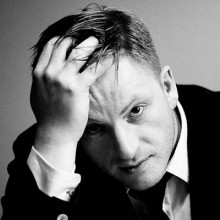Polish literature

Szczepan Twardoch
Born in 1979, Twardoch is a writer and journalist. He now disassociates himself from his earliest fiction, which is full of querulous emotion.
His first two books (The Madness of Captain von Egern and Sternberg) showed a penchant for historiosophic fantasy, making creative use of the philosophy of history and the spirit of revolution. His novel Pastor Trzaska’s Epiphany brings a change of tone. In it Twardoch moves towards contemporary issues, joining in the heated debate on exposure of communist collaborators within the Catholic church. This issue also features, though with a more radical accent, in his political thriller, Transfiguration, where the main character is a lieutenant in the Security Service. The world of the secret communist militia is portrayed here with brutal ruthlessness. Twardoch’s next book, By the Law of the Jungle, also has a radically anti-communist tone, especially the story that opens the collection, The Bodhisattva. His next work was a crime thriller called Cold Shores, whose plot centres mainly on issues to do with the Polish-German identity of the central character, Johann Schmidt, aka John Smith. Identity dilemmas are also a theme in Eternal Grunwald (2010), in which Twardoch examines Polish-German antagonism through the filter of national stereotypes. The narrator is Paszko, a child conceived as the result of King Kazimierz the Great raping a townswoman of Nuremberg; as a mixed-race bastard, he becomes a cruel murderer, and then seeks his own death. When he finally finds it – he is killed at the Battle of Grunwald – he doesn’t descend into non-existence, but gains a new consciousness that embraces the past and the future. The conclusion that follows from his transmigration is that believing in “Eternal Grunwald”, and thus in the endless fight of national elements, is a dangerous, destructive illusion. A year later, Twardoch published a collection of six stories, It’s Good Like That, which in various ways takes issue with life’s defeats, lack of acceptance, fear of ridicule and humiliation or the insincerity of people’s attitudes. The year 2012 brought Morphine – which has been widely acclaimed, complimented and rewarded (with prizes including the Paszport, issued by the weekly Polityka) – a study of male weakness, in which three strands are artfully interwoven: psychological, historical and thriller. The action of the novel (which also includes flashbacks) is set over a three-week period in 1939. The central character is Konstanty Willemann, son of a German aristocrat and a Polonized Silesian woman. When his wife draws him into a newly organized conspiracy, he becomes a latter-day incarnation of Konrad Wallenrod (the hero of an epic poem by Mickiewicz, who destroys the Teutonic Knights from the inside). Twardoch’s novel shows that national issues are inextricably linked with sexuality, and are shot through with madness. Opposition is a recurring refrain: powerful women as opposed to weak men. Suffice it to say that in Morphine we have a singular narrative style – a female voice keeps interrupting the first-person narrative, shifting it into the third person. The strategy of using a historical mask has been dictated by the need to depict the first month of the Nazi occupation as a time of trial – above all a test of character.
BIBLIOGRAPHY
- Obłęd rotmistrza von Egern [The Madness of Captain von Egern], Lublin: Fabryka Słów, 2005.
- Sternberg [Sternberg], Warsaw: Super NOWA, 2007.
- Epifania wikarego Trzaski [Pastor Trzaska’s Epiphany], Wrocław: Wydawnictwo Dolnośląskie, 2007.
- Przemienienie [Transfiguration], Dębogóra: Wydawnictwo Dębogóra, 2008.
- Prawem wilka [By the Law of the Jungle], Warsaw: Super NOWA, 2008.
- Zimne wybrzeża [Cold Shores], Wrocław: Wydawnictwo Dolnośląskie, 2009.
- Wieczny Grunwald. Powieść zza końca czasów [Eternal Grunwald: a Novel from Beyond the End of Time], Warsaw: National Centre for Culture, 2010.
- Tak jest dobrze [It’s Good Like That], Warsaw: Powergraph, 2011.
- Morfina [Morphine], Kraków: Wydawnictwo Literackie, 2012.
- Drach [Drach], Kraków: Wydawnictwo Literackie, 2014.
- Król, Kraków: Wydawnictwo Literackie, 2016.
-
Lepiej, byś tam umarł (with Mamed Khalidov), Warszawa: GW Foksal, 2017
-
Ballada o pewnej panience: wszystkie najważniejsze opowiadania, Kraków: Wydawnictwo Literackie, 2017
-
Jak nie zostałem poetą, Kraków: Wydawnictwo Literackie, 2019
-
Pokora, Kraków: Wydawnictwo Literackie, 2020
Other books:
- Zabawy z bronią [Playing with Weapons], Dębogóra: Wydawnictwo Dębogóra, 2009.
- Wyznania prowincjusza [Confessions of a Provincial], Warsaw: Fronda, 2010.
- Sztuka życia dla mężczyzn [The Art of Life for Men], Warsaw: Świat Książki, 2013 (co-authored with Przemysław Bociąga).
- Wieloryby i ćmy, Kraków: Wydawnictwo Literackie, 2015
TRANSLATIONS
Croatian:
- Morfij [Morfina], transl. Emilio Nuić, Zagreb: Hena com, 2018.
Czech:
- Morfium [Morfina], transl. Michael Alexa, Brno: Host, 2017.
Dutch:
- De koning [Król], transl. Charlotte Pothuizen, Amsterdam: Nieuw Amsterdam, 2019.
English:
- King of Warsaw [Król], transl. Sean G. Bye, Amazon Publishing, 2020.
French:
- Transfiguration [Przemienienie], transl. Ewa Rawicz-Władyka, Paris: Bellicum: Terra Mare Éd., 2010.
- Morphine [Morfina], transl. Kamil Barbarski, Lausanne [Paris]: Les Éditions Noir sur Blanc, 2016.
- Drach, transl. Lydia Waleryszak, Lausanne [Paris]: Les Éditions Noir sur Blanc, 2018.
German:
- Morphin [Morfina], transl. Olaf Kühl, Reinbek: Rowohlt Verlage, 2015.
- Drach, transl. Olaf Kühl, Berlin: Rowohlt, 2016.
- Wale und Nachtfalter: Tagebuch vom Leben und Reisen [Wieloryby i ćmy. Dzienniki 2007-2015], transl. Olaf Kühl, Berlin: Rowohlt Berlin Verlag, 2019.
- Der Boxer [Król], transl. Olaf Kühl, Berlin: Rowohlt Berlin Verlag, 2018.
Hungarian:
- Morfium [Morfina], transl. Gábor Körner, Budapest: Typotex, 2015.
- A király [Król], transl. Gábor Körner, Budapest: Typotex, 2018.
Macedonian:
- Morfium [Morfina], transl. Ilija Trajkovski, Skopje, Begemot, 2016.
Romanian:
- Morfina, transl. Cristina Godun, Cluj-Napoka: Casa Cărtii de Stiintă, 2015.
Russian:
- Вечный Грюнвальд [Wieczny Grunwald], transl. Sergejs Moreino, Innostrannaya Literatura, nr 5-6, 2020.
Serbian:
- Morfijum [Morfina], transl. Jelena Ćirlić-Jović, Beograd: Dereta, 2016.
Silesian:
- Drach: Edycyjŏ ślōnskŏ, transl. Grzegorz Kulik, Kraków: Wydawnictwo Literackie, 2018.
Slovenian:
- Morfij [Morfina], transl. Staša Pavlović, Ljubljana: Cankarjeva založba, 2016.
Ukrainian:
- Morfij [Morfina], transl. Ostap Ukrainets, Harkiv: Ranok Publishing House, 2018.
Gallery



